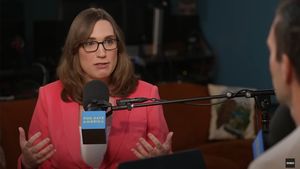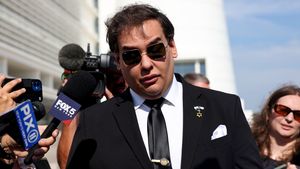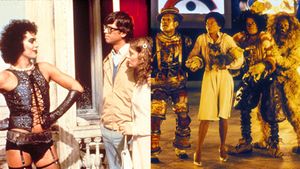(Photo: John Francis)
Becoming an LGBT entrepreneur is tough. The modern market is a difficult place to create awareness for your new and brilliant idea, and at times, it feels like the road to success is paved with struggle after struggle.
If you're on Instragram, you've likely heard of Kit Williamson and John Halbach. PRIDE talked to these ambitious gents (and the driving forces behind the gay-themed, Emmy-nominated series EastSiders), and they told us about their experiences to help give you rising entrepreneurs out there some inspiration!
PRIDE: What were your dream jobs growing up?
Kit: I knew I wanted to be in the entertainment industry from a pretty early age. I left home to study acting and writing at Interlochen Arts Academy when I was sixteen and discovered that the thing I really loved was writing dialogue in playwriting class, which led directly to writing EastSiders.
John: The earliest dream job I remember was to design scenery for puppet shows. Then one I took more seriously, and still have some regrets about abandoning, was to be an animator for Disney. I loved to draw and still love that world, but once I saw my first Broadway show, I turned all my energy toward acting. It was actually the pre-Broadway, out-of-town tryout of the revival of Grease starring Rosie O’Donnell, Megan Mullally, Sam Harris, and Billy Porter. My mom took me to see it in Minneapolis and as we drove home that night I said that’s what I wanted to do.
PRIDE: Did you ever start in one direction and realize you were meant to follow another? How did that help you?
John: Certainly. Making EastSiders as a first-time producer lead me to the total life change of starting to work in advertising. Based upon my experience doing the social media, PR, and marketing for the first few seasons of the show, I was offered a role at an agency in New York creating digital campaigns for Broadway shows. It was my first, real-life "go to an office" job, and it never would’ve happened if we hadn’t made EastSiders.
Kit: Definitely. John and I both started acting in theater, doing Broadway in our early twenties. I was studying playwriting in undergrad, but never entertained the idea of acting in my own work. It seemed self-indulgent to me, maybe because a lot of my peers who were doing it were egomaniacs. It wasn’t until years later that I realized I was denying myself an incredible opportunity to combine two things I love doing.
PRIDE: What was the most valuable thing your learned from building your businesses?
John: I’ve learned that just because I haven’t done it before, doesn’t mean I can’t do it now. All of the things I’ve done over the last few years from producing a series, to being a social media manager, to running a social media department were all trial by fire, learn as you go experiences for me. There were certainly moments of fear and doubt, but with supportive friends, colleagues, a willingness to learn, and Google, you can probably figure it out!
Kit: I’ve learned, fairly recently, that the things that seem like they will hold you back or pigeonhole you may well be the things that make you special and unique. Don’t be afraid of occupying a niche. Find what you do best and do it to the best of your ability. Conversely, I’ve learned that it’s super important to be known for more than one thing at a time. That’s one of the reasons why John and I embraced Instagram and creating branded content, like our travel series for Out Magazine. We also launched our own travel and lifestyle blog, Where Gentlemen Go, to create a platform for other queer writers to tell their stories.
PRIDE: Do you think there's a difference between LGBT entrepreneurs and straight ones?
John: In some ways I think it’s an advantage to be LGBT as an entrepreneur. Right off the bat your brand and your audience can be more defined, specific, and niche than that of a straight counterpart. Like the strippers say in “Gypsy,” you gotta get a gimmick, and depending on what you’re selling, being gay can be an appealing defining characteristic. That said, you may also lose out on opportunities, consumers, and fans for the exact opposite reason. Obviously not everyone in this country wants to support LGBT businesses and projects, but hopefully that’s changing.
PRIDE: What would be three points of advice you'd give to somebody that's starting out with an idea?
John: 1.) Live in the present. Don’t assume everything will be okay down the road and just wait for that to magically happen. 2.) Be open to and actively pursuing new skill sets all the time. You never know when something might spark your interest in a really exciting way and change the game for you. 3.) Make your own work and your own opportunities. It’s very easy to sit on an idea or wait for someone else to come along and make your dreams come true.
Kit: 1.) Know what your goals are. Think in specifics, rather than broad strokes 2.) Write those goals on paper and break them down into achievable, concrete steps. And 3.) hold yourself accountable, because no one else is going to.
PRIDE: To what do you owe your success, particularly with your filmmaking?
Kit: I’m going to go ahead and credit our relationship here. There have been so many moments where we thought this whole thing was going to come crashing down, and we really relied on each other to stay strong and persevere. I’m beyond grateful to have a real partner in my life like John.
John: There’s no way we could’ve done it without each other, and there’s no way we could’ve done it without countless other superstar people who have come in and out of this project over the years. There aren’t a lot of people who get to tell LGBT stories spanning multiple seasons of a series, and I’m very grateful we’ve gotten to do it these last 6 years.































































































































